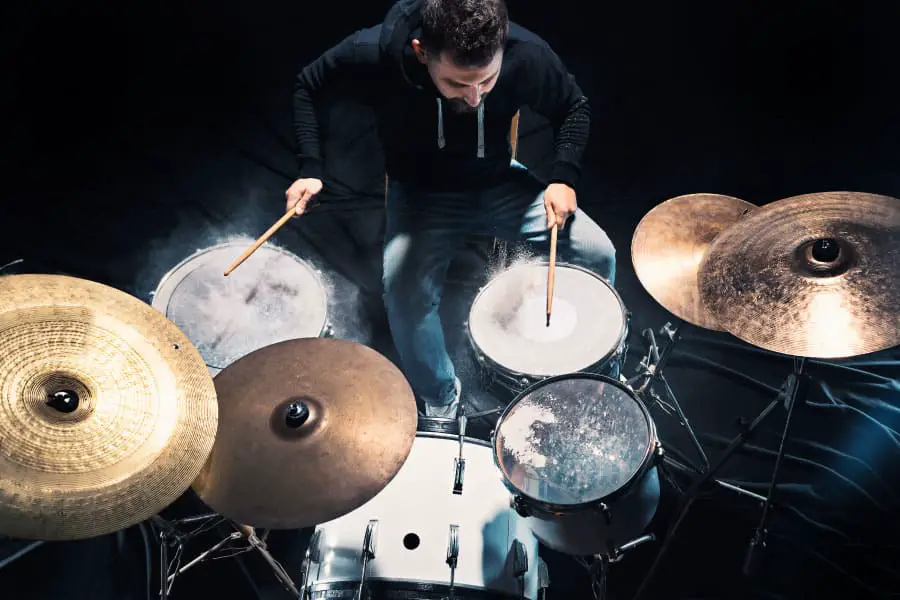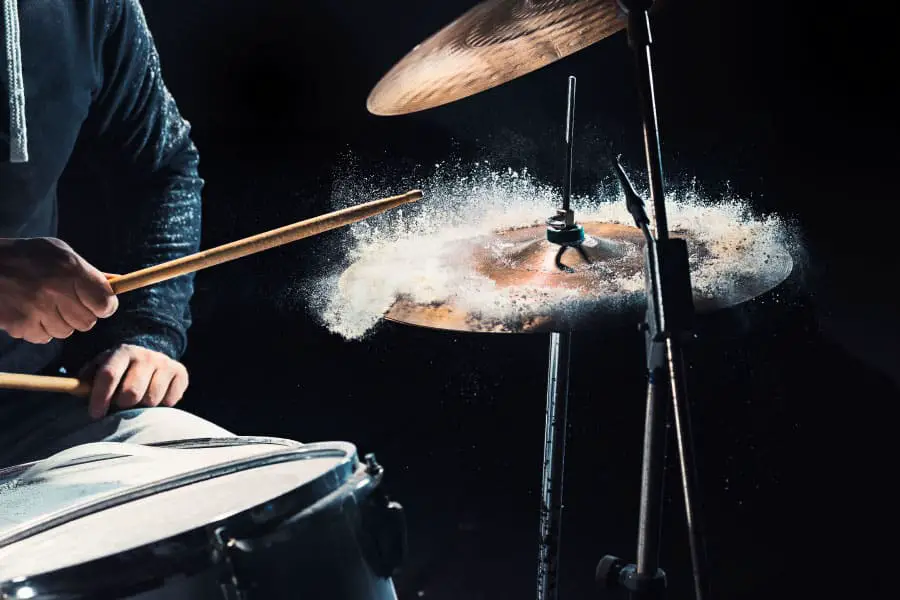
No matter if I’m recording an acoustic kit or an electronic kit, I always record drums first, and this is for many reasons. The reasons are pretty straightforward, and some of them not as much as you would think. Here is an article that covers it all.
It would help if you always recorded drums first because you need to lay down a clean solid drum sound to lay your other instruments and vocals over. If your drum sound is good, you can adjust instruments and vocals before recording them, creating a cleaner, easier, and more professional mix. Another reason is that musicians tend to relax and record better when listening to a drum groove rather than a click, and they can express themselves in a track more so.
This article will cover the differences in recording and mixing because we need to understand them a little. Then I will go over acoustic and electronic drums and do the same principles apply to them both for recording. Lastly, I will go over situations when you can consider recording other instruments first.
Recording vs. mixing
To understand why we would consider recording drums, we must first understand the difference between mixing and recording. Some people confuse the two, and they are completely different. Once we understand the aspects of the drums relating to both, we can make an overall judgment on when and why we should recording drums first.
Recording
Sound recording is when we record and reproduce a mechanical, electronic, digital, or electrical signal (for sound recording, this is a sound wave). So, for instance, this could be singing or instrument music or even the spoken voice.
Basically, it means we can capture and reproduce what we hear, and in terms of a studio, it refers to instruments and singing.
Mixing
Mixing, also known as sound or audio mixing, is how multiple sounds (in our case, it refers to instruments and singing) are combined into one or more channels. In the mixing process, the source is manipulated in various ways to produce one single element (a song). The source gets manipulated or enhanced, and a variety of elements can be adjusted and affected when mixing, such as volume, EQ, panoramic positioning, and more.
Why would you record drums first?
Now knowing the differences, we can deduce a couple of reasons why you would record drums first. The drum’s frequency range is large. That means it spans from a very low-frequency range to a very high-frequency range (from 40hz all the way up to 20khz).
This means that when you record and mix it, more often than not, you lay the drums down first and get a nice mix of them and then lay down all the instruments and vocals on top of that.
You would mix the other instruments according to the drums and the drum’s sound. You would essentially create the best drum sound you can get according to the bass drum, snare drum, hats, and cymbals.
Then, while you are recording the other instruments, such as the guitar, you could take a few moments to tweak, EQ, and compress the guitar before recording, giving you more room to manipulate it once it is recorded.
For example, let’s say that the guitar is heavy on the bass side while being played alongside the drums. While recording it and listening to it over the drums, you could set your external EQ and drop the bass before you record. Once the recording is done, you have a nice clean guitar that you don’t have to manipulate and change trying to remove its bass.
The same goes for any instrument. This is why drums are usually, and most engineers and producers like to record them first. Otherwise, if you have recorded all the instruments and vocals and start your mix, you may find that some instruments interfere with the drums at certain frequencies, causing your mix to boom, sound too loud, or causing the sound to be just plain horrible.
Other factors regarding why you would record drums first
Other factors that don’t include easier mixing when in the production phase that relate to why you would record drums first include:
Feel (timing & tempo)
Most musicians that play in a band rely on the drums to move them through the song. They just don’t play the same way and definitely don’t record the same way when doing so with a click (metronome). When you record the drums first, and the grooves have fills, build-ups, and musicians recording the instruments feel this atmosphere; they can hear the drums, relax and express themselves more, giving you a better recording.
Another factor is that some musicians find it difficult to keep time to a metronome and find it somewhat easier to keep time recording to a drum groove.

Recording electronic drums
Gone are the days of analog recording (micing up kits with microphones). You can purchase electronic kits that are midi controlled. With these, you can record the drums and then you will really them to your DAW in the form of midi. If you have expensive 3rd party plugins like EZdrummer or Superior Drummer, you can put any samples you want to those midi drums bringing them to life. You could change kit sounds at the click of a button going from reggae to rock to grunge to country and more.
I use EZdrummer 2 in my studio for recordings, along with several of their separate kits.
Check out EZdrummer 2 on Amazon.
You can then also manipulate and change each sample, get the finest control, and get the sound you want for each kit’s part. When recording a drum kit traditionally, there is a lot of bleed from the other parts of the kit. Depending on how many microphones you can use for micing up and recording your kit, you may be limited to grouping parts of your kit together when you record, giving you less separation and control over your mix in production.
Hence, you can’t mix them too much, and you cannot get a lot of separation between the different parts of the kit. With midi and samples, you can do whatever you like, and you have the utmost control.
Should you record electronic drums first then?
In my experience, if you have an electronic kit as I have in my studio, then you can get away with recording drums later rather than first. As I said, you can manipulate and change almost every aspect of a sample drum sound; you have full control and the utmost separation between the parts of the drumkit.
The electronic kit I use in my studio is the Donner DED-200 Electric Drum Set Electronic Kit.
Now because you can manipulate, have full control, and separation of the kit when using midi, you can sometimes record drums later if the situation arises. For example, the drummer can only make it into the studio on the weekend, but the instrumentalists have to come during the week before that.
Then you could get away with recording drums and tweaking the sound in the mixing process. Although I still prefer laying the drums down first and getting a solid mix with them before I tend to record anything else.
Recording Acoustic drums
Most producers like to record acoustic drums because this gives the sound subtle nuances; it gives a human feel and a certain sound compared to that of electronic kits. One is not necessarily better than the other they are just different. This experience you cannot capture on electronic drums even though you will be able to manipulate your sample however you wish.
However, if you are recording acoustic drums, then without a doubt, I would always hands-down suggest that you record them first. As we discussed, depending on your recording setup (your kit size, kit quality, and a number of mics),
Check out my article on How Many Mics Do You Need To Record Drums here.
You really need to record them first and try to get the best sound you can in order for the rest of the recording and mixing process to go as smooth as possible.
Why would you record other instruments first?
The only times you may find yourself recording other instruments first are due to circumstance. The drummer can’t make it into the studio, or the other musicians need to record first because of various deadlines or schedule conflicts.
Another reason could be because the song has a certain feel or vibe to it, and the drums aren’t the main focus of the track or song. For example, let’s take a song where the drums only come in on the chorus with a soft groove using brushes. The entire song leans heavily on the keys and guitar getting the job done, and the drums are just there to uplift the song in the chorus.
In this case, you need to capture the song’s essence by getting the guitars and keys recording correct and then fitting the drums in there afterward.
Conclusion
We find that you would always want to record drums first for several reasons, preferably. The main one when recording acoustic drums is that you need a nice clean sound in production to record and mix other instruments and vocals over the drums with ease. Drums fill up the entire sound frequency spectrum, and you need to manipulate their sound in production so you can get a good clean mix when everything else is thrown in there. This is hard to do sometimes with an acoustic kit because of the number of sections you have for the kit, the kit’s quality, and the number of microphones you have for the kit that allows for recording.
Other factors that influence recording drums first include feel, and this relates to other musicians who need help to maneuver and record their parts of a song. They can record easier, keep time better, and give more soul when they can hear a drum groove instead of a click.
If you have an electronic kit, you can sometimes get away with recording other instruments first because you have full access to individual sounds and samples of a kit through your DAW and 3rd party plugins that utilize midi. You are able to manipulate these sounds to any desired effect in your mixing process, removing the need to get the other recorded instruments’ sounds just right.
I hope this article helped you understand a little bit more about the process of recording drums. If you enjoyed this article and didn’t really know how to mic up a kit, then you have to check out my article on How Many Drum Mics Do You Need To Record Drums? – here.
You can learn about the differences between rubber and mesh drum kits here.



